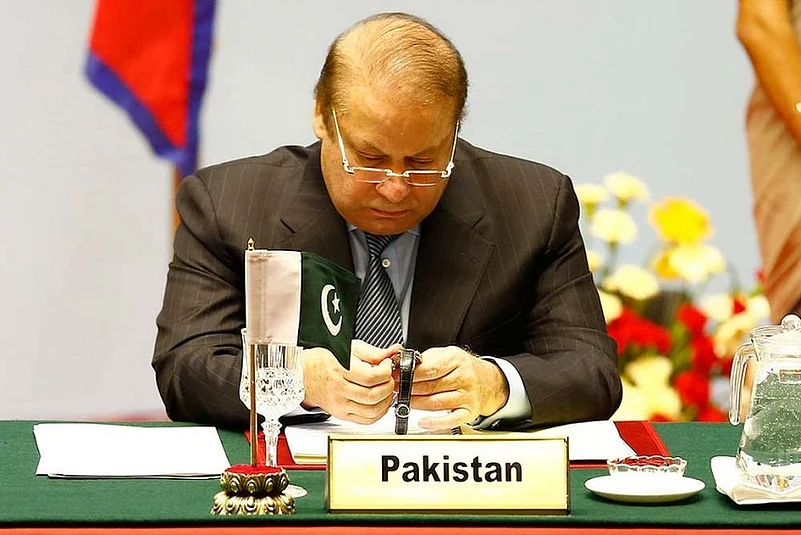1997 was a memorable year for more than one reason in Pakistan. In February, Nawaz Sharif’s Pakistan Muslim League with a `N’ in brackets that stands for his name won an unprecedented two-thirds majority in the National Assembly.
It appeared at the time that Sharif would remain strong and almost untouchable for a couple of years. He did not lose any time in starting his favourite ventures, such forging friendly ties with India which was greatly helped by then Indian prime minister IK Gujral, developing extremely business friendly policies, suppressing Benazir’s People’s Party and consolidating power by legal changes which went to the extent of amending the Constitution.
Differences started between the government and the Supreme Court over a number of issues, including reduction of the number of judges in the latter. A few Supreme Court judges sided with the government while some supported the chief justice Sajjad Ali Shah, a Sindhi, who issued a contempt of court notice to Sharif for failing to comply with the court orders. The prime minister appeared and two days later was issued a charge sheet on grounds of contempt. His disqualification appeared imminent. A week later, prime minister’s supporters attacked the Supreme Court and judges virtually ran from their seats to save their lives. A serious crisis had developed which led to the army chief sitting with all concerned and leading to the resignation of President Leghari, who despite being from the People’s Party had dismissed its government in 1996 on grounds of corruption and the chief justice replaced by another judge. Sharif had managed to prevail in this round, but could not two years later when General Pervez Musharraf toppled him.
Two decades down the road, prime minister Sharif is trying to repeat history now when faced with perhaps the most dreadful judicial scrutiny of his life. His supporters were distributing mithai (sweets) just a month ago when three members of a five-member bench of the Supreme Court had disagreed with the minority decision to immediately disqualify him. The three judges instead resorted to appointment of a joint investigation team (JIT) to further probe the allegations of corruption against the prime minister in relation to purchase of expensive flats in London. The judgment was a close call because even if just one more judge had sided with the minority of two, Sharif would have ceased to be in power. He survived, but it now appears that not for long.
The JIT started its investigation and Sharif started to feel the heat in a few days time. It started by what it has successfully tried in such matters for the past three decades: delaying tactics. It filed an application in the Supreme Court objecting to two of the JIT members. The court within days disposed of the objection by rejecting it. The eldest son of the prime minister, Hussain, had no option but to appear.
In the process, the PM family had antagonised these two JIT members and had shown its helplessness and powerlessness in front of the court. The JIT got the message and became aggressive by repeatedly calling Hussain Nawaz to explain the money trail which enabled him to acquire the London flats. All that Hussain could do was to complain that the JIT was pressuring him and illegally and unlawfully asking for documentation that it was not entitled to.
A well-known journalist belonging to the Jang Group, Ansar Abbasi, was activated who came up with the revelation that the Registrar Supreme Court had called the Securities Exchange Commission and the State Bank to specifically nominate in the JIT the two gentlemen whom Hussain Nawaz had objected to. The Supreme Court bench handling the matter clarified that it had asked the registrar to make the phone call to ask for these two gentlemen in view of their expertise.
As if the two rebuffs were not enough, an unknown senator of the ruling party from Karachi, Nehal Hashmi, made a speech threatening everybody who put pressure on the PM’s son. He said that such individuals will not be allowed to survive along with their children. The speech became viral first on the social media and then on the electronic media. The chief justice who was the PM’s law secretary at the time of the earlier judicial crisis in 1997 took suo motu notice of the senator’s speech and referred it to the same bench handling the London flat case. The bench reacted heatedly and issued a charge sheet to the senator for contempt and one of the judges likened the present government to Sicilian mafia which threatens judges and their children. Making yet another mistake, the government issued a detailed statement condemning the remarks of the Supreme Court judge and called it deplorable. It called the remarks baseless and against the code of conduct and the oath taken by the judges.
This statement will further annoy the Supreme Court judges and cannot be regarded as a good political or legal move. The contempt notice issued to the ruling party’s senator has silenced the government ministers who were constantly coming on the television with some lamenting that the judiciary treats Imran Khan lightly as opposed to Sharif.
The Supreme Court is also hearing a petition filed against Khan, asking him to show the money trail that enabled him to purchase a plot of land in the Islamabad suburb Banigala near Rawal Lake. The government is trying to make a big deal of the case without realising that Khan has never held a public office in his life and is claiming that the money was lent to him by his former wife Jemima whom he repaid after selling his London flat.
The military is, interestingly, a silent observer to all these developments and not playing an active role at the moment even behind the scenes. Currently, the Supreme Court is exerting enough pressure on the prime minister which has tremendously weakened him. The JIT is directed by the court to submit its report within 60 days of its formation and so the coming weeks are being watched by all political observers with keen interest.
(The author is an advocate of the Supreme Court of Pakistan).
























